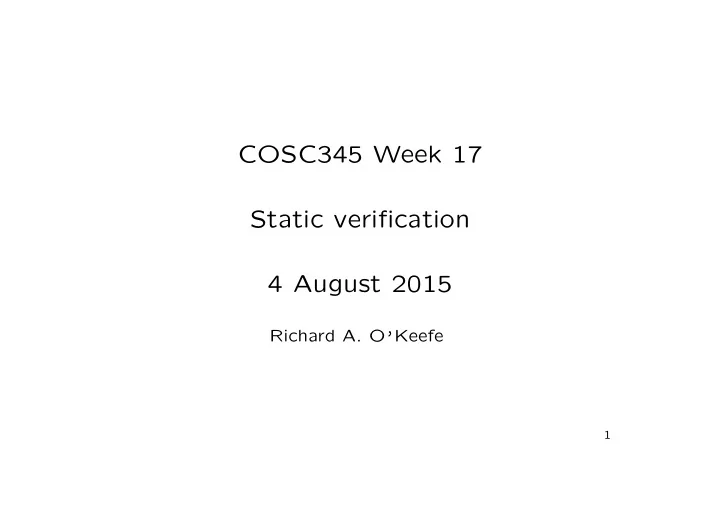

COSC345 Week 17 Static verification 4 August 2015 Richard A. O ’ Keefe 1
Aim of static verification Find defects early Work on incomplete components Work on non-executable items N.B. Testing and debugging cannot start until executable compo- nents are sufficiently complete, test data are available, test setup in place. That may be too late. 2
Value of static verification estimated 50% to 90% faults findable faults found early no risk to system data faults not masked by other faults can find problems other than faults sampling can be used (common faults are common) but cannot replace testing 3
Automatic static verification syntax checks control flow (unreachable, some nonterminating) data flow checks interface checks abstract execution cross reference and spelling checks layout rules (see ‘indent ’ , ‘astyle ’ ) 4
Automatic verification for C Some compilers do little, gcc and especially clang do more enable all warnings to start with. UNIX has lint, finds oddities as well o does cross-file checks which even gcc doesn ’ t o warns about error results not examined SPlint (n´ e LClint) is free, UNIX/Windows, all lint does plus o pointer tracking and name style enforcement o and bounds checking (vital for security) 5
Not stated means not checked A static checker cannot check requirements that it cannot be told about. ∼ /quasar/anthony.d/bp.c has static void train(void) /*@globals nin, in_units, npat, in_pats, nhid, hid_units, ih_wts, nout, out_units, ho_wts, out_pats, momentum, criterion, learn_rate;@*/ /*@modifies in_units, hid_units, out_units, ih_wts, ho_wts, kepoch, *stdin, *stdout, *stderr;@*/; 6
What ’ s wrong with these loops? 1. for (i = 1; i <= N; i++) a[i] = 0; 2. for (i = 0; i <= N; i++) a[i] = 0; 3. for (i = 0; i < N; j++) a[i] = 0; 4. for (i = 0; i < strlen(s); i++) s[i] = tolower(s[i]); 5. for (i = 0; i < N; i++) a[i++] = 0; 6. for (i = 0; i < N; i++) a[i] == 0; 7. p = a-1; for (i = 1; i <= N; i++) p[i] = 0; All are legal C! 7
Answers 1. Will probably run off the top of a[] 2. Will almost certainly run off the top of a[] 3. Increments wrong variable (quite common) 4. O ( N 2 ) method; O ( N ) is easy 5. Increments counter twice 6. Statement has no effect 7. Constructs illegal pointer (a-1) 8
FindBugs for Java omitted null checks pointless null checks pointless new String(...) exposing mutable private data calling String.+ in a loop cases where an encoding is advisable but missing serialisable objects with non-serialisable parts 9
FindBugs for Java (II) exception handlers that don ’ t handle dead assignments (long)(a*b) where (long)a*b would be appropriate (double)(x/y) instead of (double)x/y unused fields (caused by shadowing, say) clone() not calling super.clone() implementing Cloneable but not mentioning clone() 10
FindBugs for Java (III) implementing Comparator but not Serializable implementing hashCode() or equals() without the other switches without a default writes to static fields (not good with threads) exceptions that might not be caught exceptions caught that can ’ t be thrown Formats using \ n instead of %n 11
FindBugs for Java (IV) unconditional wait() wait() not in a loop broken lazy initialisations (a concurrency bug) inner classes that should probably be static things that should be ’ final ’ but aren ’ t . . . and lots lots more 12
Example non-code verification <!doctype exam system "exam.dtd"> <exam paper=cosc325 year=1998 semester=2 duration=3> <title>Software Enginerring <section choose=5> <quest> <squest><p>What is prototyping?<mark>2 <squest><p>What is the purpose of prototyping?<mark>4 <squest><p>Where does prototyping fit in <name person>Boehm</name>’s <q>spiral</q> model of the software development process?<mark>4 13
What can we check? Proper nesting of parts Each part has mark or subparts but not both Choose N implies all parts have equal marks Question numbering consistent Cross-references valid, consistently labelled Quotes < q > balanced and alternate None enforceable using WYSIWYG (both can check spelling) All important 14
Manual static verification high level semantics style common fault pattern recognition don ’ t keep a dog and bark yourself Semi-automated items go into structured data base checker poses “pattern” questions used in Y2K inspection 15
Program inspections can be formal or informal need your own checklist is up-front expensive but not as expensive as not doing it requires practice 16
Very important indeed People must not feel threatened by inspections. The policy must be that pay/tenure/status will not depend on inspection results, and this policy must be adhered to . Inspection meetings must not be threatening. Consider making the code anonymous and having the author absent. Inspections generate a list of actions; they must be followed up. 17
Rˆ oles Owner Claims item inspection-worthy; responsible for having de- fects corrected Inspector Person who inspects item; need more than one Reader Presents code at meeting Scribe Takes minutes Moderator Manages meeting; responsible for keeping it cool Chief moderator Manages inspection process as whole 18
Resources lint-paper.pdf — local copy of Lint paper fi.pdf is the NASA Software Formal Inspections Guidebook; you were directed to that earlier. fistd.pdf is the NASA Software Formal Inspections Standard; the guidebook expounds it. its4-1.0.1.tar.gz “It ’ s The Source, Stupid! Security Scanner” Splint 3.1.2 at http://www.splint.org/ HTML Tidy and HTML Validator at http://www.w3.org 19
Resources II http://findbugs.sourceforge.net/ is the site for FindBugs(TM), a user-extensible static checker for Java. http://en.wikipedia.org/wiki/ESC/Java2 has links for the Extended Static Checker for Java. Most Smalltalks now include the Refactoring Browser, which in- cludes the SmallLint checker for Smalltalk. AWK and Perl are good for checking data files. Don ’ t overlook the possibility of using Lex (Flex) and Yacc (Bison) to write your own checkers (like the example last week). 20
Resources III SPARK is a verifiable subset of Ada There is a SPARK toolset for it. It now comes with GNAT (part of gcc). There ’ s a book about it in the library. 21
Recommend
More recommend